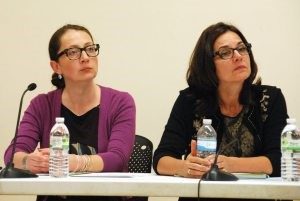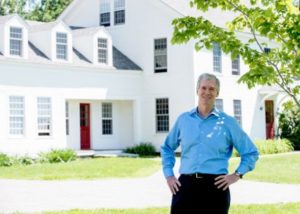President Kevin Quigley (Thailand 1976-79) MARLBORO COLLEGE PARTNERS WITH REFUGEE CENTERS
Thanks to a “heads up” from Bill Preston (Thailand 1977-80)
MARLBORO COLLEGE PARTNERS WITH REFUGEE CENTERS
FEB. 26, 2017, 12:06 PM
BY MIKE FAHER
Kevin Quigley (Thailand 1976-79), the president of Marlboro College
BRATTLEBORO – Working with refugees will become part of the curriculum for some Marlboro College graduate students later this year.
Under a new partnership with the U.S. Committee for Refugees and Immigrants, students enrolled in the college’s Teaching English to Speakers of Other Languages program can apply to spend an academic year working in one of the committee’s resettlement centers scattered across the country.
It’s meant as an immersive way for Marlboro master’s degree students to get practical experience in their field. It’s also “responsive to the needs of the world,” said Kara Hamilton, an admissions counselor at Marlboro’s graduate school who is coordinating what’s been dubbed the English for Refugees Fellowship.
“How do you respond to the needs of students who have experienced trauma, and how do you create teachers who bring that lens to their practice?” Hamilton said.
Marlboro’s new fellowship arrives as the word “refugee” has become a political flashpoint. The plight of refugees has gained new national prominence given the efforts of President Donald Trump to temporarily bar them from coming to the U.S. and limit immigration from some Muslim-majority countries.
In Vermont, Trump’s executive order initially halted a controversial effort to bring Syrian refugees to Rutland. A subsequent court reversal of that order opened the door for that program to possibly continue.
Marlboro College President Kevin Quigley is among those who have spoken against the president’s immigration policies. And in announcing creation of the English for Refugees Fellowship, Hamilton declared that “it’s really important that we stand in solidarity” with refugees and all immigrants.
However, the roots of the new fellowship reach beyond the current political turmoil. Hamilton said she and Beverley Burkett, chairwoman of Marlboro’s Teaching English to Speakers of Other Languages program, have been working on the initiative for about a year.

Stacie Blake, right, director of government and community relations
at the U.S. Committee for Refugees and Immigrants, appears at a meeting
in Rutland with Vermont Refugee Resettlement Program Director Amila Merdzanovic.
They first visited the Committee for Refugees and Immigrants’ Colchester resettlement center, then pitched the idea to the national organization’s leadership. “They saw a lot of alignment between our mission and theirs,” Hamilton said.
It is a new type of arrangement for the committee, which is based in Arlington, Virginia. “I think it’s the first time that we have partnered this extensively (with a college),” said Stacie Blake, the committee’s director of government and community relations.
The fellowship is structured this way: Between summer residencies at Marlboro, students will spend from September to May at one of the committee’s six resettlement centers. In addition to the Colchester site, those centers are in Albany, New York; Erie, Pennsylvania; Cleveland; Dearborn, Michigan; and Des Moines, Iowa.
Students will teach English to refugees and immigrants while earning credit toward their graduate degree. The fellowship is unpaid, though it comes with a $5,000 scholarship.
Those on both sides of the agreement see potential benefits.
The committee’s mission is to “protect the rights and address the needs of persons in forced or
voluntary migration worldwide and support their transition to a dignified life.” To that end, the organization provides a variety of services including assistance with finding housing, health care, education, employment, legal representation and interpreters.
And there are plenty of people seeking those services. In federal fiscal year 2016, the six resettlement centers that are involved in Marlboro’s new fellowship program saw 3,248 people, according to figures Blake provided.
The busiest was Dearborn, with 759 clients. Vermont’s center was the least busy but still hosted 386 people that year.
Blake said she is hoping that the assistance of Marlboro students will “really help us expand capacity. There’s a great need for English language training in all of our field offices.”
Marlboro College’s Graduate School. Photo by Mike Faher/VTDigger
For Marlboro’s Brattleboro-based graduate school, the fellowship is – at its most basic level – a new kind of practicum opportunity that may attract more students who aren’t already well-established teachers.
“We want to make the program more accessible to younger and less-experienced teachers,” Hamilton said.
Those who are accepted into the fellowship program will be expected to impart a critical skill – language – that refugees may need so they can “access basic needs, health care and employment, and … weave a new community,” Marlboro administrators say.
But in a larger sense, Hamilton also sees the partnership between Marlboro and the committee as a partnership between students and refugees – a chance to “stand alongside” recent immigrants, with education flowing both ways.
In addition to helping prepare students for a teaching career, administrators say the fellowship could lay the groundwork for nonprofit program development, international relations and policymaking.
“I hope (Marlboro’s students) learn a lot from the students they work with,” Hamilton said. “I also hope we prepare them to learn more about the process of resettlement.

President Quigley’s action represents the gold standard response to a misdirected government. Let’s hope it serves as a model for academics throughout the country to emulate.